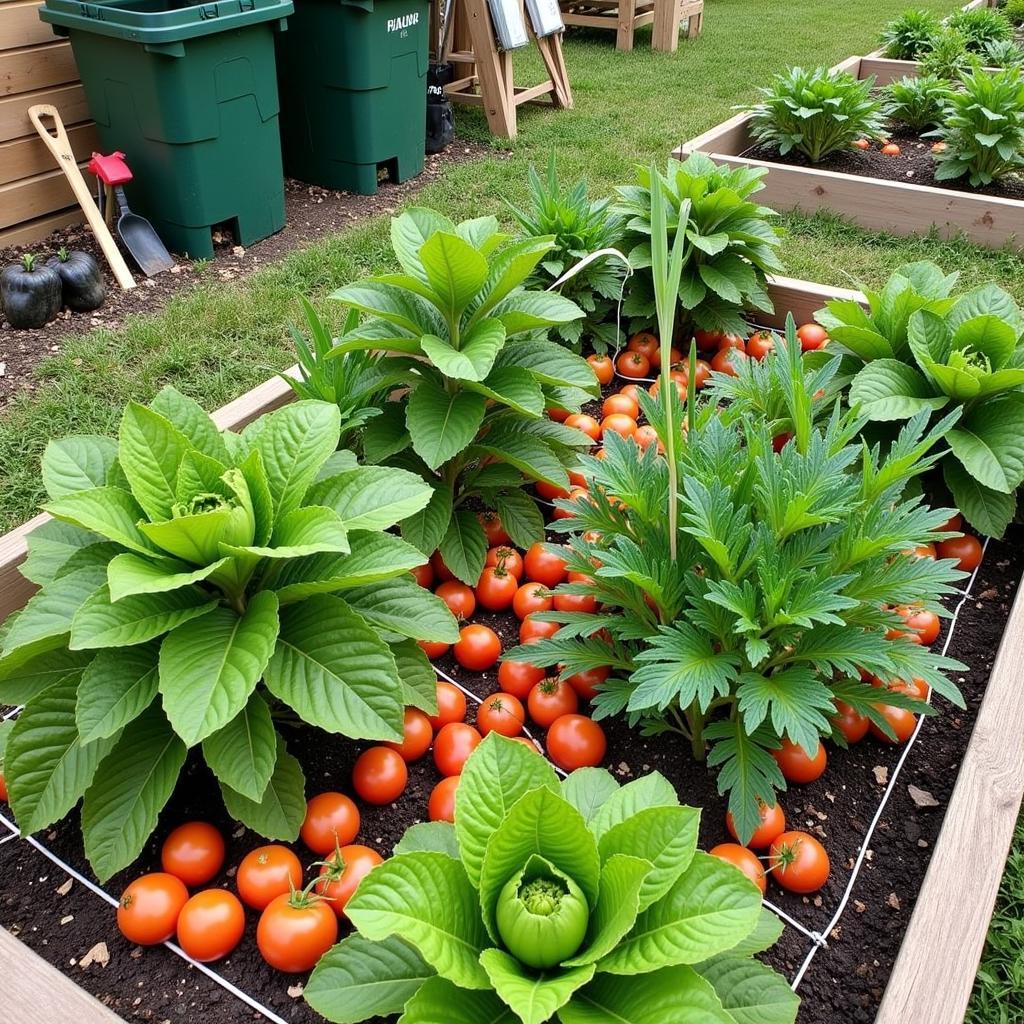Backyard Food Production is more than just a trend; it’s a return to our roots, a way to connect with nature, and a powerful tool for building a more sustainable future. From growing vibrant vegetables to raising chickens for fresh eggs, cultivating your own food offers a wealth of benefits, both for your well-being and for the planet. Whether you have a sprawling garden or a small balcony, embracing backyard food production can transform your relationship with food and empower you to take control of your sustenance.
Creating a thriving backyard food system requires planning, dedication, and a touch of creativity. By understanding the principles of sustainable gardening, choosing the right plants for your climate, and implementing effective pest control strategies, you can maximize your yields and enjoy a bounty of fresh, homegrown produce. But the rewards extend far beyond the dinner table. Backyard food production fosters a deeper appreciation for the natural world, reduces your environmental impact, and strengthens your connection with your community.
Getting Started with Backyard Food Production
So, you’re ready to embark on your backyard food production journey? Excellent! The first step is to assess your available space and resources. Do you have a sunny patch of land perfect for a vegetable garden, or are you limited to a balcony or patio? Understanding your limitations will help you choose the right plants and techniques. If you’re new to gardening, consider starting small with a few easy-to-grow vegetables like lettuce, tomatoes, and herbs. As you gain experience, you can expand your garden and experiment with more challenging crops.
Check out our guide on creating a green food forest for a truly sustainable and integrated backyard food system.
Remember that soil health is crucial for successful backyard food production. Enriching your soil with compost, worm castings, or other organic matter will provide the nutrients your plants need to thrive. Regular watering and proper drainage are also essential for healthy plant growth.
 Backyard Vegetable Garden Setup
Backyard Vegetable Garden Setup
Maximizing Your Yield with Companion Planting and Pest Control
Once your garden is established, you can implement techniques to maximize your yield and protect your precious crops from pests. Companion planting, the practice of growing different plant species together for mutual benefit, can deter pests, attract beneficial insects, and improve soil health. For example, planting marigolds alongside tomatoes can help repel nematodes, while basil planted near peppers can enhance their flavor.
Natural pest control methods, such as using beneficial insects like ladybugs and lacewings, can help keep unwanted pests at bay without resorting to harmful chemicals. Creating a balanced ecosystem in your backyard will attract these helpful creatures and minimize the need for intervention.
For those interested in attracting wildlife to their backyard, consider our guide on the best deer and turkey food plots.
Expanding Your Backyard Food Production Beyond the Garden
Backyard food production isn’t limited to growing fruits and vegetables. Raising chickens for fresh eggs is another rewarding aspect of creating a sustainable food system. Chickens provide not only delicious eggs but also valuable manure for your garden. Building a chicken coop is a relatively simple project, and the daily ritual of collecting fresh eggs is a truly satisfying experience.
You can also explore other options like beekeeping for honey or cultivating mushrooms. The possibilities are endless! Backyard food production is a journey of continuous learning and experimentation.
Are you interested in plant-based eating? Download our plant-based food list PDF for inspiration.
Conclusion
Backyard food production offers a pathway to a healthier, more sustainable, and more fulfilling life. By taking control of your food supply, you not only nourish your body but also connect with nature and contribute to a more resilient future. Whether you’re a seasoned gardener or a complete beginner, embracing backyard food production is a rewarding endeavor that will enrich your life in countless ways.
FAQs
-
What are the easiest vegetables to grow for beginners?
Lettuce, tomatoes, and herbs are great starting points for beginner gardeners. -
How can I improve the health of my garden soil?
Adding compost, worm castings, or other organic matter will enrich your soil. -
What are some natural pest control methods?
Beneficial insects like ladybugs and lacewings can help control pests naturally. -
Is it difficult to raise chickens in my backyard?
Building a chicken coop is a manageable project, and raising chickens is a rewarding experience. -
What other types of backyard food production can I explore?
Beekeeping, mushroom cultivation, and composting are other options to consider. -
How can I learn more about aerobic digesters for food waste?
Check out our article on aerobic digester food waste. -
What is Lok food?
Learn about Lok food on our website.
Common Scenarios and Questions:
-
Scenario: New gardener struggling with pests.
-
Question: What are some safe and effective ways to control pests in my vegetable garden?
-
Scenario: Limited space for backyard food production.
-
Question: What are the best plants to grow in containers on a balcony or patio?
Further Exploration:
Explore these other articles on our website for more information:
- Aerobic digester food waste
- Best deer and turkey food plots
- Lok food
- Green food forest
- Plant-based food list PDF
Contact Us
For assistance, please contact us at Phone: 02437655121, Email: minacones@gmail.com Or visit us at: 3PGH+8R9, ĐT70A, thôn Trung, Bắc Từ Liêm, Hà Nội, Việt Nam. We have a 24/7 customer support team.